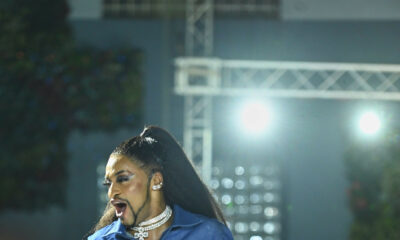News
Fashion As a Form of Expression, Is Our Cultural Society Ready For This?
According to the Urban Dictionary, “A real nonconformist would like stuff before it was fashionable, during its fashionableness and after it has gone out of fashion.” Nonconformists are the trendsetters; they make their own trends and people imitate them. They are the likes of Lady Gaga and Gwen Stefani.
Lady Gaga is an American pop artist whose fashion choices are known for treading the thin line between being avant-garde artistry and being wildly outrageous. She never fails to make a fashion statement and always has a message to deliver. She possesses a controversial sense of style, which you can either love or hate. She uses fashion and music as platforms to express herself and according to her, “when I’m writing music, I’m thinking about the clothes I want to wear on stage. It’s all about everything altogether art, pop performance art, and fashion. For me, it’s everything coming together and being a real story that will bring back the super-fan. I want to bring that back. I want the imagery to be so strong that fans will want to eat and taste and lick every part of us.” In spite of her bizarre style, Lady Gaga is considered a fashion icon and is respected in the fashion industry; she has reinvented the edgy looks of Grace Jones and Madonna and made them her own. There is an inscrutable air about her but one thing that Lady Gaga always exudes is confidence. Her most memorable appearance is showing up at the 2011 Grammy Awards in a giant egg and crawling out of it to sing to the world that she was ‘born this way’.
Another nonconformist fashionista rock and roll sensation, Gwen Stefani is no slave to typical fashion norms. She has broken every fashion rule there is and has managed to make it look cool. Her style is punk and edgy and she has remained loyal to this form of expression throughout out her career. As a teenager she would experiment by sewing her own clothes, eager to create her own fashion identity. “Everyone knew not to walk in my room without shoes on, ’cause of the pins’, she says. In spite of her metamorphosis from a child star to a mother, one thing that has been constant is Gwen’s style. She is easily identified by her bright red lips and by her blond hair. Many have criticized her idiosyncratic fashion sense but she is still considered a fashion icon and a trendsetter. She has successfully created a signature style and owns her own fashion label, L.A.M.B.
These two are not the only style icons going against traditional styles of expression; the permissive American society and the even more lax environment of Hollywood creates an atmosphere conducive to such experimentation and free expression through fashion. This is quite unlike our society; there is a restricted platform for such blatant expression in Nigeria. In a more judgmental society like ours, it is rare to see someone who stands out from the crowd in terms of fashion. You hardly see an emo chick with dark makeup and spiky hair walking around without snide comments being made or being reprimanded by ‘elders’. Those who have dared to give free reign to creative expression in their dressing have been called names (gay, hideous, attention whores) and misrepresented by the tabloids. A victim of this is Denrele.
Denrele Edun is someone you would call a public figure, an entertainment personality. His style is punk and fun, an extension of his personality. He has owned his look to a point that seeing it on someone else is just weird. He is a fashion rebel with no cause besides being himself. In an interview with ModernGhana.com he said, “I am just expressing my individuality. Most people ask me that question and I would say I just want to be me. Some people think I dress like this to attract attention, but I have always had attention from childhood.” A lot of people curb their creativity because they are expected to look a certain way that has been dictated by society, parents or religion; therefore their style has no individuality, this means it lacks personality and does not reflect their character, this is not necessarily a bad thing but style should be a platform that allows an individual to express themselves as they deem fit.
I carried out a survey to find out how everyday people feel about fashion as a form of expression and if their cultural society restricts their style. Aisha, an Economics student from Kano State, was clad in a long dress and a veil, and when asked why she was dressed like that, her response was “this is the way a Muslim girl is required to dress and besides my Dad will kill me if he sees me in something else”. She was asked to pick an alter ego style and she said, “I love Serena from Gossip Girl, if I had my way I would dress like her all the time.” Yvonne, a Communications and Multimedia student from Edo State, feels that living in Nigeria restricts her style. According to her, “it’s the way people would make judgments about you if you look a certain way. I’d like to dress more rock ‘n’ roll, but in Nigeria especially, people will make the assumptions that you’re immoral and irresponsible.” Mrs. Okafor, a banker who resides in Yola, Adamawa State, said that if her daughter ever decided to dress Goth, “I don’t care what she’s trying to express, I will beat sense into her.” Damola, an Information Technology student from Lagos, describes his style as old school. “I like to keep it simple and neat, none of that crazy stuff,” he said.
These responses suggest that our society is still medieval in its attitude towards fashion and the older generation is finding it difficult to understand or relate to the younger generation. The younger generation individuals are stifling their creativity for fear of criticism and judgement. From what I gathered, the society has found justification for being close-minded towards what is commonly referred to as a ‘foreign form of expression’; it fears corruption of behaviors and also pollution of culture. In our society being a non-conformist is all kinds of wrong, it means you don’t follow rules and this is seen as a sign of disrespect. Usually non-conformists are associated with something bad, since most of them get their inspiration from pop culture and rock and roll, their sense of style is rumored to be influenced by the devil and one thing our society will not condone is anything devilish for Nigerians are known to be very religious. You can wear leather from head to toe and have on as much piercing as you want, the most you get are hushed whispers as you walk by or hideous looks but accessorize with a red horn and your look becomes offensive. The larger issue is, should it be deemed offensive or viewed merely as self expression?
I believe fashion is a form of expression and according to Anna Dello Russo, Japanese Vogue’s editor-at-large, blogger extra-ordinaire and international style sensation, “I don’t want to be cool, I want to be fashion”. Fashion is art and allows for creativity whereby one is able to have an individual identity that makes one special. What you wear portrays to the world who you are, and it gives people a visual perception of you. People should be able to wear their emotions. If I’m feeling like a princess today I should be able to wear a tutu skirt with yellow tights and a tiara without being sent out of class or taken to church for deliverance. This brings up the question, is Nigeria ready for fashion as a medium of expression?
Sources
Wiki Fashion
People.com
Modern Ghana
Urban Dictionary
___________________________________________________________________________________________
Twitter: @ReineMichi
Blog: http://uberchicmichi.blogspot.com
























